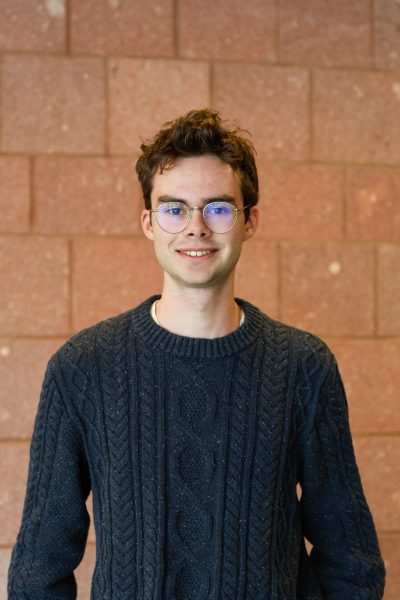To the Class of 2027:
I’d like to humbly welcome you to Grinnell, even though it truly feels like we’ve already been here for three months. I think that’s usually how it is. The term starts like a bowl of spaghetti crashing into a brick wall. It’s loud, it’s messy, it’s quick. Nobody knows what hit them. You may get tomato sauce in your hair. But you figure out a way to clean yourself up and sweep away the shards, and then enjoy your meal.
The day I arrived back on campus for this fall semester, my fifth at the College, was the first time I returned here without a hard knot of dread in my stomach. It was a wildly exciting and unfamiliar feeling, and I had been doing real work to actualize it. Perhaps there are some Grinnell students who have never associated any dread with this place, and I salute them, but I haven’t met any of them. I suggest that if you haven’t already, you make peace with dread. Some of it is quite justified. Invite it in, pull up a chair for it and it will blend in with the rest of the people at the dinner party better than if you were to try to ignore it. (I’m full of lots of metaphors about eating this week about eating, it seems.)
Because offering advice that no one asked for is daunting, I’ll start out by borrowing my first real piece of it from Lucy Polyak `23––spend the College’s money. They have far too much of it for their own good, and you would be surprised at the kind of stuff they are willing to fund! If you can make a case for it, there are offices who will help you out. There are scholarships and grants you have never heard of (look them up), but if those don’t appeal to you, think of new ways to spend. You will have some very cool experiences because of it.
Take music lessons. These are perhaps the final years of your life that will be dedicated to the endeavor of learning, and some (some!) of the stuff we learn here is unbelievably dry and uninspiring. Music is such a joyous thing to learn. If you are willing to invest some time and tolerate some frustration, the ability to tickle the strings or the keys, or to use your voice as the instrument it is, will be a true friend to you over the course of your life. Also, 30-minute lessons are “free,” as in, they come with the cost of attending Grinnell. If you’re already a musician, I dare you to take voice lessons. Being a beginner at something is criminally underrated––it’s a crucial practice. If music is not important to you, I am afraid we may be fundamentally different people and that none of my advice will apply to you. I am only sort of kidding.
Don’t believe what they say about first year friend groups. Or, don’t believe everything they say about first year friend groups. The person or people you meet within days of getting here really might be some of your best friends as long as you live—that happens all the time, and it’s beautiful. Or a couple people might drift away, leaving survivors (or becoming survivors, depending on how you look at it). Groups of friends may fracture painfully or disband amicably. There may be no groups or friends to speak of at all for certain periods of time, which will end. Try to let things unfold without getting too attached to the outcome. Even if you maintain strong, early-days friendships, your life in two or three years will look very different from how it looks now. This is a good thing.
Building strong friendships with intentionality and generosity, as well as wholeheartedly investing your time and your life force into a community, will always be more important than falling in love.
Smile! At! People! You! Have! Only! Met! Once! I can’t tell you how many times I have—very bravely!!!—attempted eye contact and a smile with someone I once had a class or one conversation at a party with, only to be completely ignored. This makes nice people like me very sad. Make an effort to remember people! Don’t be scared–they probably remember you, too! That’s why we’re all here! By way of addressing the elephant in this paragraph, here is my hottest take of this whole thing: routinely getting so drunk that you cannot remember the people you meet or the conversations you have is bad. Whatever relationship you have with substances, let it be conscious, free of compulsion and in alignment with your most authentic tastes and desires. Learning how to dance, really dance, while totally sober is—believe it or not—a superpower you can teach yourself, one that will really and truly change your brain chemistry. And it’s fun.
Oh, that brings me to my final piece of advice. You need to dance at parties. I don’t know if it’s just a PWI thing or if the technological age is making us all lonely and insecure, but I need to see more dancing at parties. Be the change, 2027!
Tenderly,
Sage & Blunt


















































